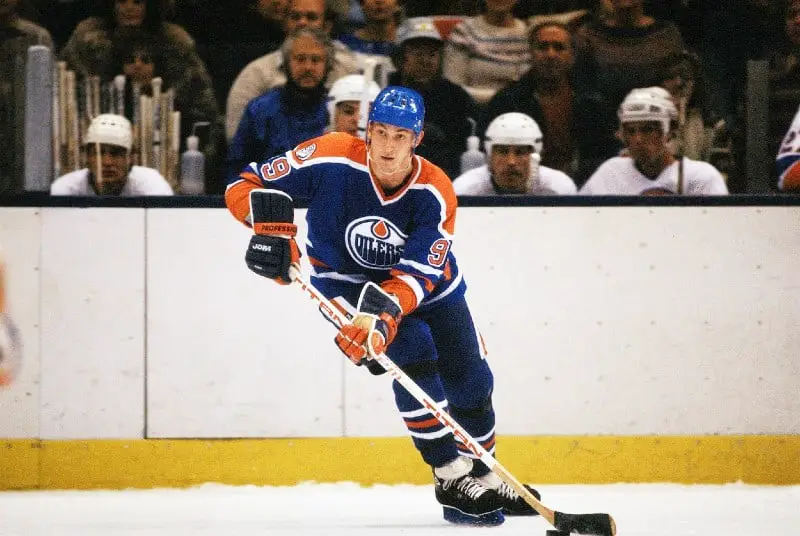The history of hockey boasts some of the most legendary and skillful athletes ever to grace the ice, each defining the sport in unique ways.
Ice hockey, originating in 19th-century Canada with roots in British stick-and-ball games, evolved from informal outdoor play on frozen ponds to a structured sport, with the first organized indoor game in 1875 in Montreal and the establishment of the NHL in 1917, spreading primarily in cold-climate regions like Canada and the northern USA.
Ice hockey is mainly popular in the USA and Canada due to their cold climates, which support natural ice rinks and a strong winter sports culture.
Historical development of the sport in these regions, coupled with established professional leagues like the NHL, has fostered widespread interest and infrastructure. Other countries lack similar conditions, cultural emphasis, or historical ties, limiting the sport’s global popularity.
Today, we’ll explore the Top 10 Best Hockey Players of All Time, highlighting icons like Wayne Gretzky, the NHL’s all-time leading scorer; Bobby Orr, who revolutionized the defenseman role; Mario Lemieux, a generational talent and Pittsburgh Penguins star; and Gordie Howe, known as “Mr. Hockey” for his unmatched longevity and toughness.
These players set unparalleled records, won multiple Stanley Cups, MVP awards, and trophies, and inspired generations with their exceptional talent, leadership, and passion.
These players are celebrated for their exceptional NHL careers, Stanley Cup victories, Hart Trophy wins, and contributions to both international and club-level ice hockey.
Through historic achievements and transformative playing styles, they elevated hockey to new heights, etching their names permanently into the sport’s prestigious legacy and influencing countless athletes worldwide.
10. Sidney Crosby

Sidney Patrick Crosby is a Canadian professional ice hockey player and the long-time captain of the Pittsburgh Penguins in the National Hockey League (NHL).
He made his NHL debut in the 2005–06 season, recording 102 points, and quickly established himself as one of the league’s elite players.
In his second season, Crosby won the Art Ross Trophy with 120 points, becoming the youngest player in any North American professional sports league to win a scoring title.
He also became the youngest captain in NHL history to lead his team to a Stanley Cup victory. In 2016, Crosby was unanimously voted the NHL’s Most Valuable Player (MVP) and was later named among the “100 Greatest NHL Players” of all time, cementing his legacy as one of the greatest hockey players in history.
9. Guy Lafleur
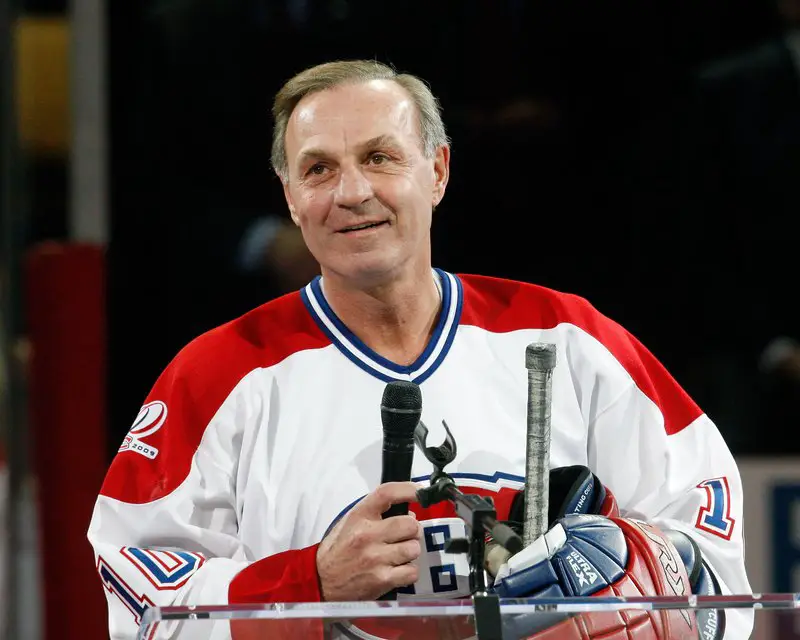
Guy Damien Lafleur was a Canadian professional ice hockey player celebrated for his remarkable NHL career spanning nearly 20 years.
Best known for his time with the Montreal Canadiens, Lafleur became the first player in NHL history to record both 50 goals and 100 points in six consecutive seasons.
Across 17 seasons, he played for the Montreal Canadiens, New York Rangers, and Quebec Nordiques, establishing himself as the all-time leading scorer for the Canadiens with 1,246 points: 518 goals and 728 assists in 961 games.
Lafleur was the fastest player of his era to reach 1,000 points, achieving the milestone in only 720 games.
His list of achievements includes six Prince of Wales Trophies, five Stanley Cup championships, three Art Ross Trophies as the NHL’s leading scorer, and the 1977 Conn Smythe Trophy as playoff MVP.
He was a two-time Hart Trophy winner and a three-time recipient of the Lester B. Pearson Award (now the Ted Lindsay Award).
Lafleur’s impact on hockey was further recognized with his induction into the Hockey Hall of Fame in 1988 and the Canadian Sports Hall of Fame in 1996.
He is widely regarded as one of the greatest right wingers and most exciting offensive players in NHL history, renowned for his speed, playmaking, and electrifying rushes.
8. Mark Messier
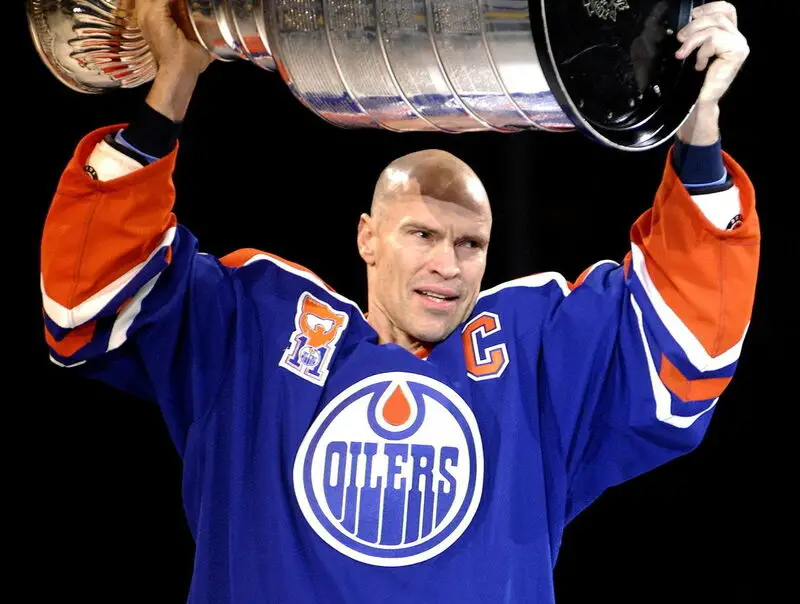
Mark John Douglas Messier is renowned as one of the greatest ice hockey players in NHL history, ranking second in all-time playoff points (295) and third for regular-season games played (1,756) and points (1,887).
Over his 25-year career, Messier played for the Edmonton Oilers, New York Rangers, and Vancouver Canucks, and also competed in the World Hockey Association (WHA).
Notably, he is the only NHL player to captain two different teams (the Oilers and Rangers) to a Stanley Cup championship, winning six times in total.
Messier was renowned for his aggressive playing style, physical strength, and exceptional leadership, earning the nicknames “The Moose” and “The Messiah.”
He twice won the Hart Memorial Trophy (1990, 1992) and was named to 16 NHL All-Star Games. Named one of the “100 Greatest NHL Players,” Messier was inducted into the Hockey Hall of Fame in his first year of eligibility.
Following his playing career, he served as a special assistant to the president and general manager for the New York Rangers, continuing to influence professional hockey and team leadership.
7. Bobby Hull
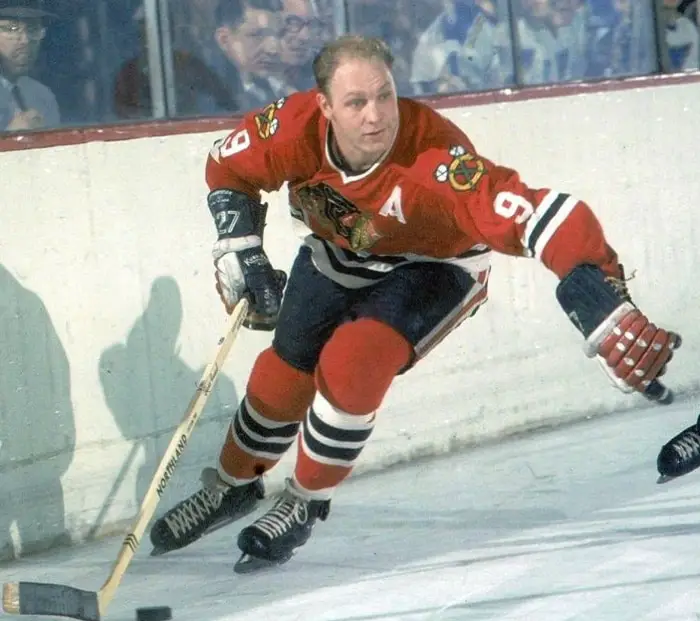
Robert Marvin Hull, widely known as the “Golden Jet,” was a legendary Canadian ice hockey player celebrated for his speed, end-to-end rushes, and high-velocity slapshot.
Hull played 23 seasons professionally, starring for the Chicago Black Hawks in the NHL and later for the Winnipeg Jets and Hartford Whalers in the World Hockey Association (WHA).
Hull won the Hart Memorial Trophy as NHL Most Valuable Player twice and the Art Ross Trophy as league scoring leader three times.
He led the Black Hawks to a Stanley Cup title in 1961 and powered the Winnipeg Jets to Avco Cup championships in 1976 and 1978.
Hull was the first NHL player to score more than 50 goals in a single season, leading the league in goals seven times during his career.
Across his NHL career, he recorded 610 goals and 560 assists for 1,170 points in 1,063 games. In the WHA, Hull added 303 goals and 335 assists in 411 games.
His iconic speed and slapshot (clocked as high as 118 mph) made Hull one of hockey’s most feared scorers.
Hull was inducted into the Hockey Hall of Fame (1983), the Ontario Sports Hall of Fame (1997), and received the Wayne Gretzky International Award (2003), cementing his legacy among the greatest hockey players of all time.
6. Jean Beliveau
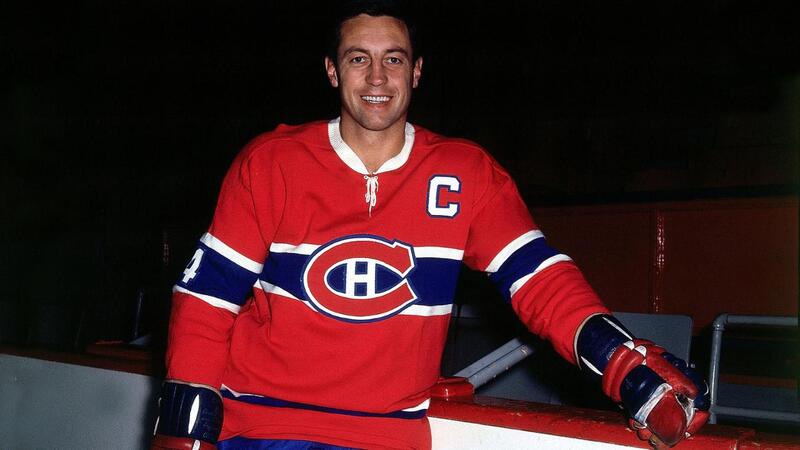
Joseph Jean Arthur Béliveau played 20 seasons in the National Hockey League (NHL) with the Montreal Canadiens from 1950 to 1971.
By his second full season, Béliveau ranked among the league’s top three scorers. He was the second player in NHL history to record 1,000 career points and the fourth to score 500 goals, finishing with 507 goals and 712 assists for a total of 1,219 points in 1,125 games.
Béliveau holds the record for appearing on the Stanley Cup a remarkable 17 times; 10 as a player and seven as a team executive with the Canadiens, which is the highest for any individual in NHL history.
He was inducted into the Hockey Hall of Fame in 1972 and named to Canada’s Walk of Fame. After retiring, Béliveau served as a vice president and director of public relations for the Canadiens, continuing his legacy as an influential ambassador for the sport.
5. Maurice Richard
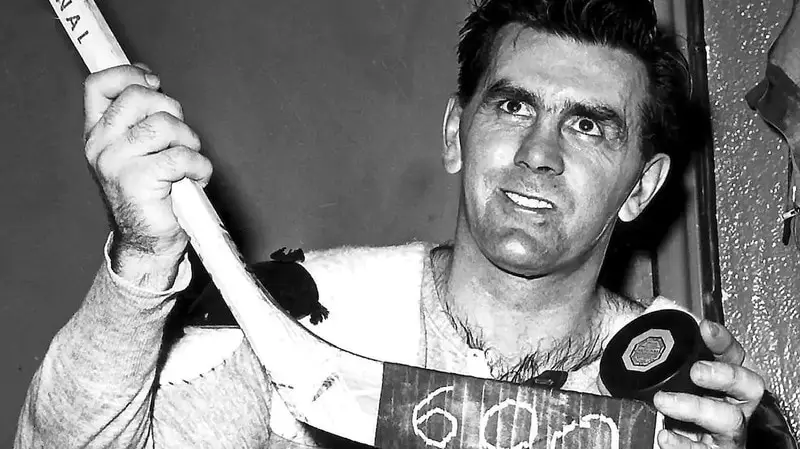
Joseph Henri Maurice “Rocket” Richard played 18 seasons in the NHL, all with the Montreal Canadiens.
He was the first player in NHL history to score 50 goals in a single season, accomplishing this feat in 50 games during the 1944-45 season.
Richard was also the first to reach 500 career goals in 1957, finishing his career with 544 goals and 421 assists in 978 regular-season games.
A dominant scorer, he won the Hart Trophy as the league’s most valuable player in 1947 and was named to 14 post-season NHL All-Star Teams, including eight First-Team selections.
Richard played in 13 consecutive NHL All-Star Games and led the Canadiens to eight Stanley Cup championships, including a record five consecutive titles from 1956 to 1960.
His number 9 was retired by the Canadiens in 1960, and he was inducted into the Hockey Hall of Fame immediately after his retirement in 1961.
The NHL established the Maurice “Rocket” Richard Trophy in 1999, awarded annually to the league’s leading goal scorer in his honor.
Richard remains a legendary figure in hockey history, celebrated for his scoring prowess, leadership, and impact both on and off the ice.
4. Mario Lemieux
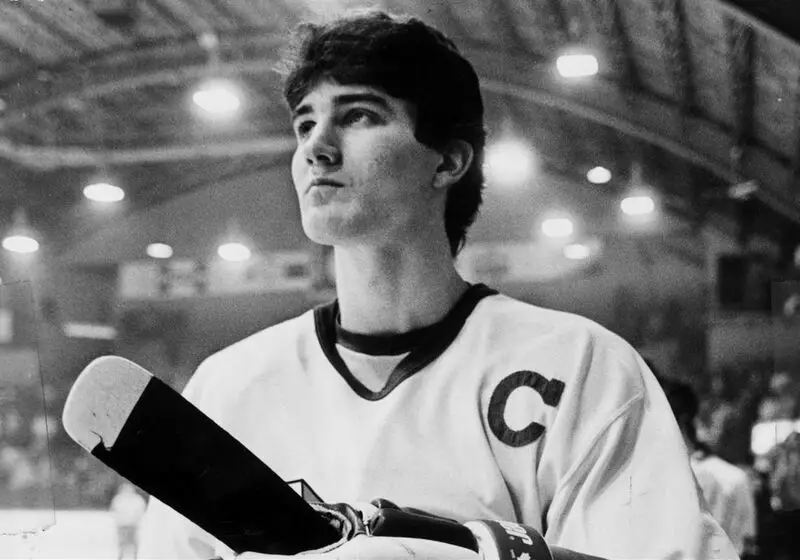
Mario Lemieux, known as “Super Mario,” played parts of 17 seasons in the NHL, primarily with the Pittsburgh Penguins. He scored a total of 690 goals and 1,033 assists, accumulating 1,723 points, ranking him seventh all-time in NHL scoring at the time of his retirement.
Lemieux’s scoring ability was exceptional, with a career goals-per-game average of 0.754, the second highest in NHL history.
He was renowned for his size, strength, and creativity, making him one of the most feared offensive players the game has seen.
Throughout his career, Lemieux won the Hart Trophy as the league’s most valuable player four times, the Art Ross Trophy three times, and the Conn Smythe Trophy twice.
He scored a goal in every one of the five possible game situations in a single game, an NHL first.
A key figure in hockey, he led the Penguins to two Stanley Cup titles as a player in 1991 and 1992, and later, as an owner, contributed to additional championships.
Inducted into the Hockey Hall of Fame in 1997, Lemieux’s legacy as one of the greatest players in NHL history remains unsurpassed in terms of skill, leadership, and impact on the sport.
3. Bobby Orr
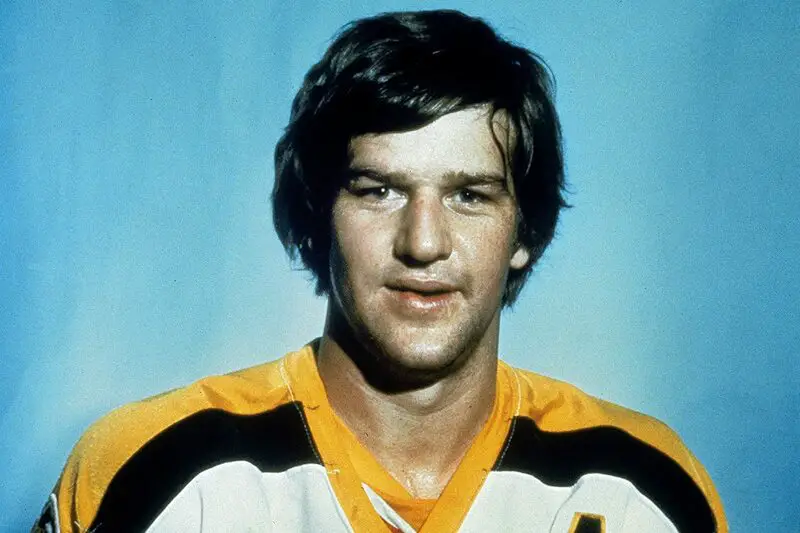
Robert Gordon “Bobby” Orr is widely regarded as one of the greatest hockey players in history, revolutionizing the role of the defenseman in the NHL.
He played 12 seasons, spending his first 10 years with the Boston Bruins and his final two with the Chicago Black Hawks.
Orr was known for his exceptional speed, scoring ability, and playmaking skills that changed how defensemen approached the game.
He was the first defenseman to win the league scoring title twice, earning two Art Ross Trophies, and won the Norris Trophy for best defenseman a record eight consecutive times.
Orr also secured three Hart Trophies as the NHL’s most valuable player and played a pivotal role in leading the Bruins to two Stanley Cup championships in 1970 and 1972, scoring the Cup-winning goals in both finals.
His career, although hampered by knee injuries, left an indelible mark on the sport.
Orr’s contracts were historically significant; he was the highest-paid rookie in NHL history due to agent negotiations, and his second contract was the league’s first million-dollar deal.
After retiring, Orr entered the player agent business, founding his agency and representing numerous NHL players.
He was inducted into the Hockey Hall of Fame in 1979 as the youngest inductee at age 31. Orr’s legacy endures as a transformative figure in hockey, both on and off the ice.
2. Gordie Howe
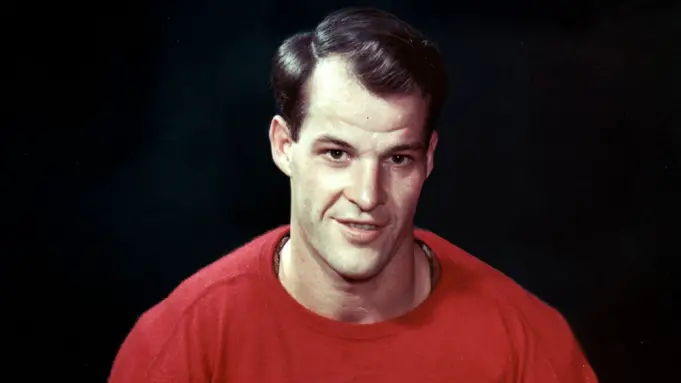
Gordon “Gordie” Howe played an unparalleled 26 seasons in the NHL from 1946 to 1980, primarily with the Detroit Red Wings, becoming one of hockey’s greatest icons.
Known as “Mr. Hockey,” Howe set NHL records for career goals (801), assists (1,049), and points (1,850), which stood for decades before being surpassed by Wayne Gretzky.
He holds the record for most NHL games played (1,767) and shares the record for most NHL seasons played with 26, tied with Chris Chelios.
Howe won the Stanley Cup four times (1950, 1952, 1954, 1955) and captured six Hart Trophies as the league’s most valuable player, which is one of the highest totals in NHL history.
He also won the Art Ross Trophy six times as league scoring leader and led the NHL in goals four times. Renowned for his all-around skill, toughness, and sportsmanship, he popularized the “Gordie Howe hat trick,” a goal, an assist, and a fight in the same game.
Howe was the only player to compete professionally in six different decades, a testament to his extraordinary longevity and dedication to the sport.
His influence extended beyond statistics, earning him recognition as one of the most complete and enduring players ever.
1. Wayne Gretzky

Wayne Douglas Gretzky, widely regarded as “The Great One,” played 20 seasons in the National Hockey League (NHL) between 1979 and 1999 for the Edmonton Oilers, Los Angeles Kings, St. Louis Blues, and New York Rangers.
He holds the record as the NHL’s leading scorer with 894 goals and 1,963 assists, totaling 2,857 points, a number far surpassing any other player in history.
Gretzky is the only player to score over 200 points in a single season, a feat he achieved four times, and he tallied 100 points in 16 professional seasons.
At the time of retirement, he held 61 NHL records, including 40 regular-season, 15 playoff, and 6 All-Star records. Gretzky won four Stanley Cups with the Oilers (1984, 1985, 1987, 1988) and was inducted into the Hockey Hall of Fame the same year he retired in 1999.
The NHL retired his iconic jersey number 99 league-wide, making Gretzky the only player to receive this honor.
Known for his unparalleled vision, intelligence, field dominance and playmaking ability, Gretzky transformed the sport and set an almost unbreakable standard in ice hockey history.
Ice hockey teams needed equally great goalies to counter these best NHL players of all time whose exceptional skill, speed, and accuracy could dominate games without elite goaltending.
Icons like Wayne Gretzky, widely regarded as the most prolific scorer and record-holder in NHL history, and Bobby Orr, who revolutionized the defenseman position, exemplify excellence on the ice.
Legends such as Mario Lemieux, Gordie Howe, and Sidney Crosby have further shaped hockey with their remarkable scoring, longevity, and championship successes.
These players hold multiple Stanley Cups, MVPs, scoring titles, and Hall of Fame inductions, answering key questions about who the best hockey players are and what legacies define greatness in the sport.
Their unique contributions and transcendence beyond their eras make them enduring symbols of hockey excellence, influencing each new generation drawn to this fast-paced, thrilling game.
How Long is a Hockey Game?
A regulation ice hockey game consists of 60 minutes of play, divided into three 20-minute periods. Each period is separated by an intermission, allowing teams to rest, strategize, and resurface the ice.
If the score is tied at the end of regulation time, the game proceeds to an overtime period. In most professional leagues, such as the National Hockey League (NHL), the overtime period during the regular season lasts five minutes and is played under sudden-death rules, meaning the first team to score wins.
If no goal is scored during overtime, the game is decided by a shootout, where players take alternating penalty shots until a winner is determined.
During the Stanley Cup Playoffs or other elimination tournaments, overtime rules differ. Instead of a brief overtime and shootout, teams play continuous 20-minute sudden-death overtime periods until one team scores, resulting in an immediate victory. This format can lead to extended, multi-overtime games that test players’ endurance and strategy.
